British Public Backs Free University: The Need for Funding Reform

‘24
By: Atyeo Thomas du Toit
As Universities face a record second year of declining applications, with even medicine relying on clearing to fill courses, we sought to find out how Britons view the current state of further education in the UK.
University Fee Reform?
At a glance: a whopping 80% think University is too expensive, over half think it should be free, and there is a narrow 3% lead among people who think too many go to university.
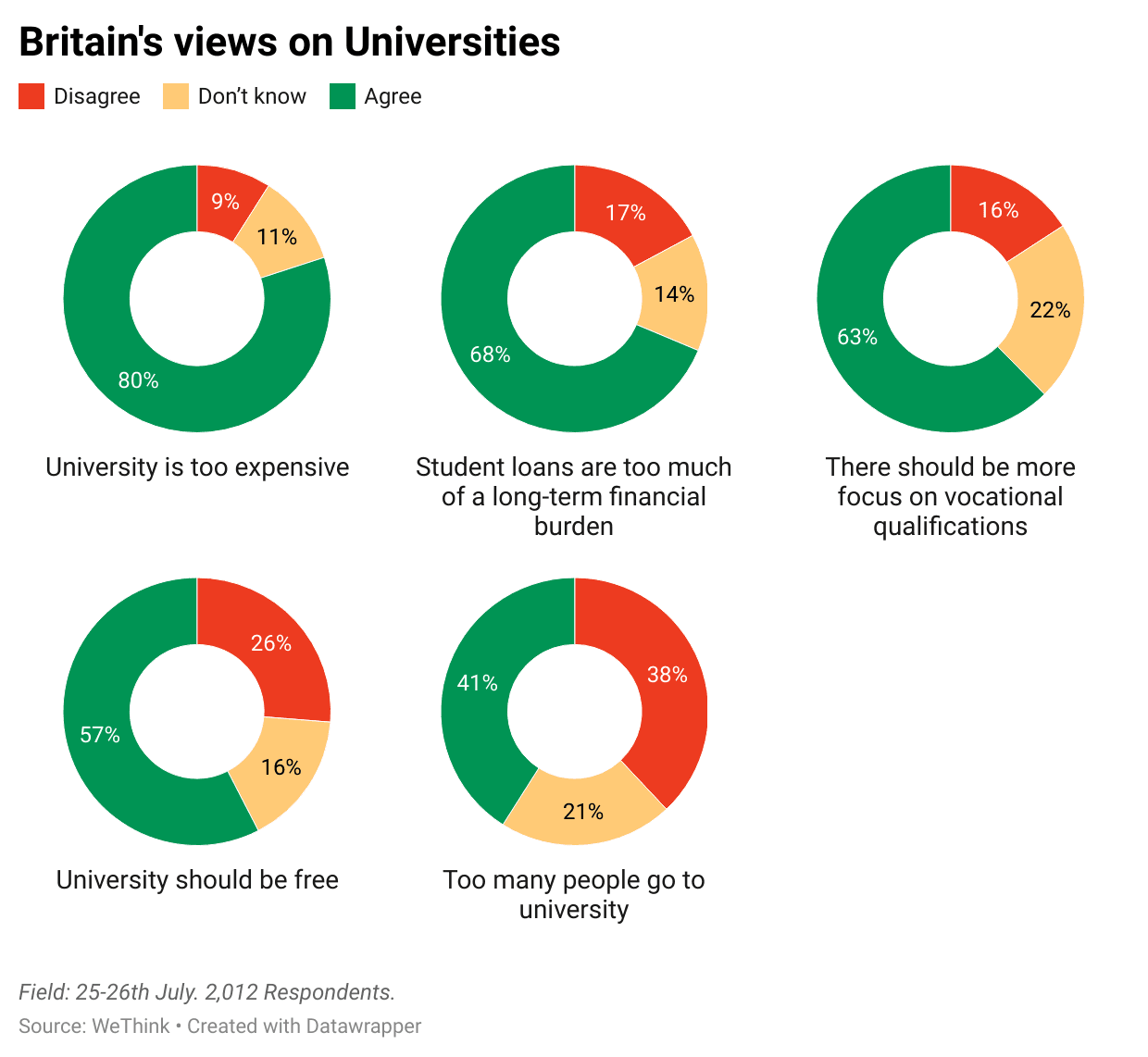
Sir Keir Starmer pledged to abolish tuition fees when he ran for Labour Leader in 2020. He has since dropped that pledge for the sake of economic stability, but public opinion seems to be on the side of the policy.
80% have said that University is too expensive, including 71% of 65+ year olds. 69% agree that Student loans have too much of a long-term impact on students. 58% think that University should be free. This makes clear that public opinion is very strongly on the side of reducing costs for students to go to university, across every demographic, and includes a significant majority of voters who think tuition fees should be scrapped completely.
In fact, split by party, the only top party in the UK that supports University fees more than opposes them are the Conservatives, by a margin of 5%. The Greens and the SNP are the strongest supporters of free university, with the latter already having abolished fees in Scotland since devolution in 2000.

We then asked questions about how student loan amounts should be calculated, if they are to continue. Currently, student loan amounts are decided based on the household income of a student’s parents, with the upper limit being £70,098. That is the equivalent of £35,049 per parent in a two parent household.
For context, in 2023 the mean UK income was £35,404 and the median UK income was £29,669. The cap for the highest household incomes therefore are between the median and the mean income, around the average for a UK worker. If we take the maximum maintenance loan amount (£10,227 for a household income of £25,000 or less) as the full amount needed to complete a year of university, then those with household incomes of £70,098+ are expected to contribute £5460 per year.
This is the equivalent of almost 8% of the pretax income of a household earning £70,098. We asked Brits what they thought about the current maintenance loan system, and they seemed divided:

Although there is a narrow lead amongst the two main parties that the amount a student can claim should not be linked to their parents’ incomes, overall 42% of Brits said it should, compared to 38% who thought it shouldn’t. 1 in 5 Brits, however, didn’t know whether it should be or not - perhaps leaving space for one side or the other to make compelling arguments if the issue comes up in future parliamentary proceedings.
Without giving any of the figures, we asked whether a household with an income of £70,000 should or should not be expected to financially help their child through university, as the current rules suggest.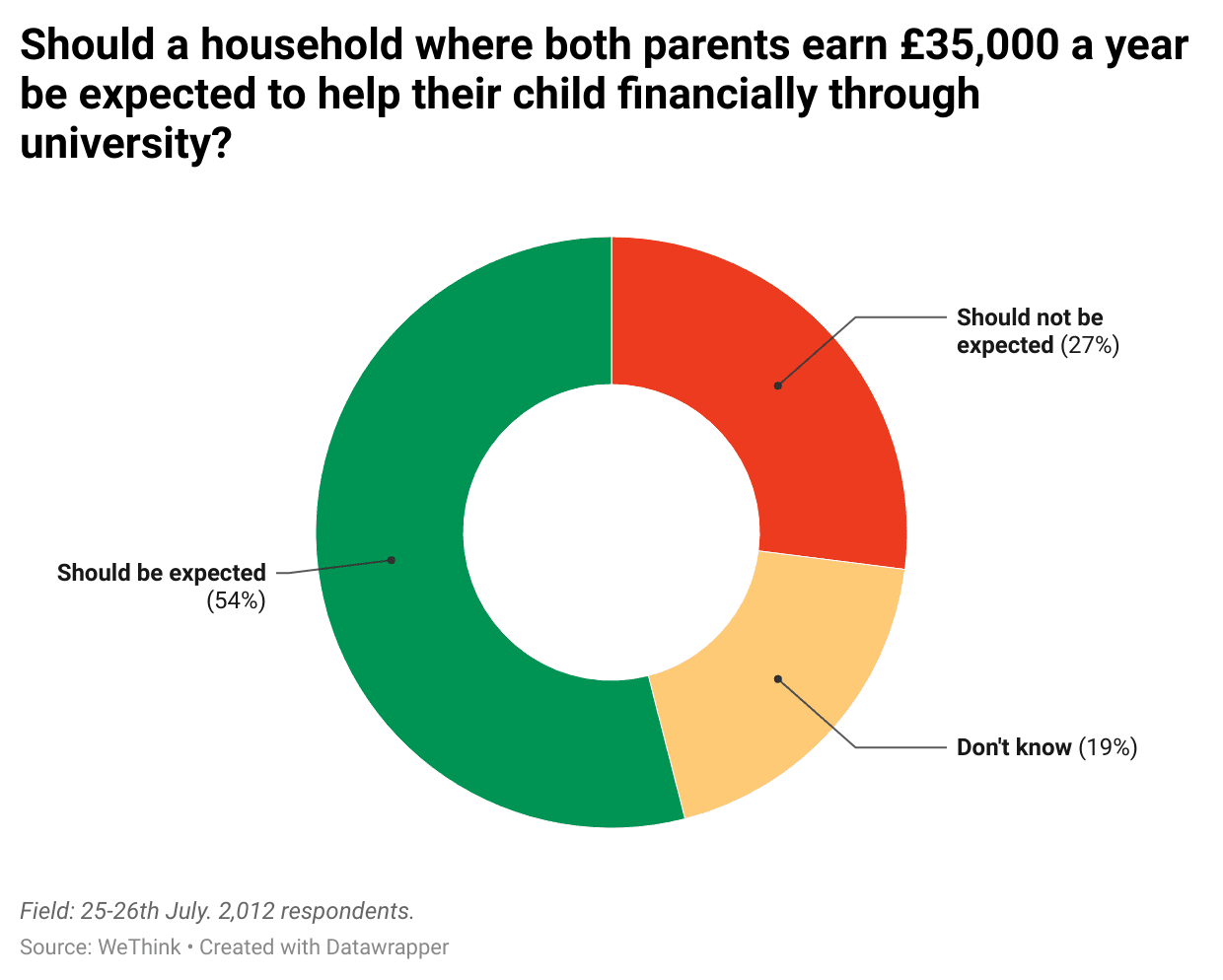
Interestingly, 54% of the public thought parents in this situation should be expected to cover some of the costs, compared to just 27% who said they shouldn’t. Perhaps, then, whilst Brits are less united on whether student loans should be based on parental income or not, they nonetheless expect parents who are better-off to contribute more to the costs of university regardless.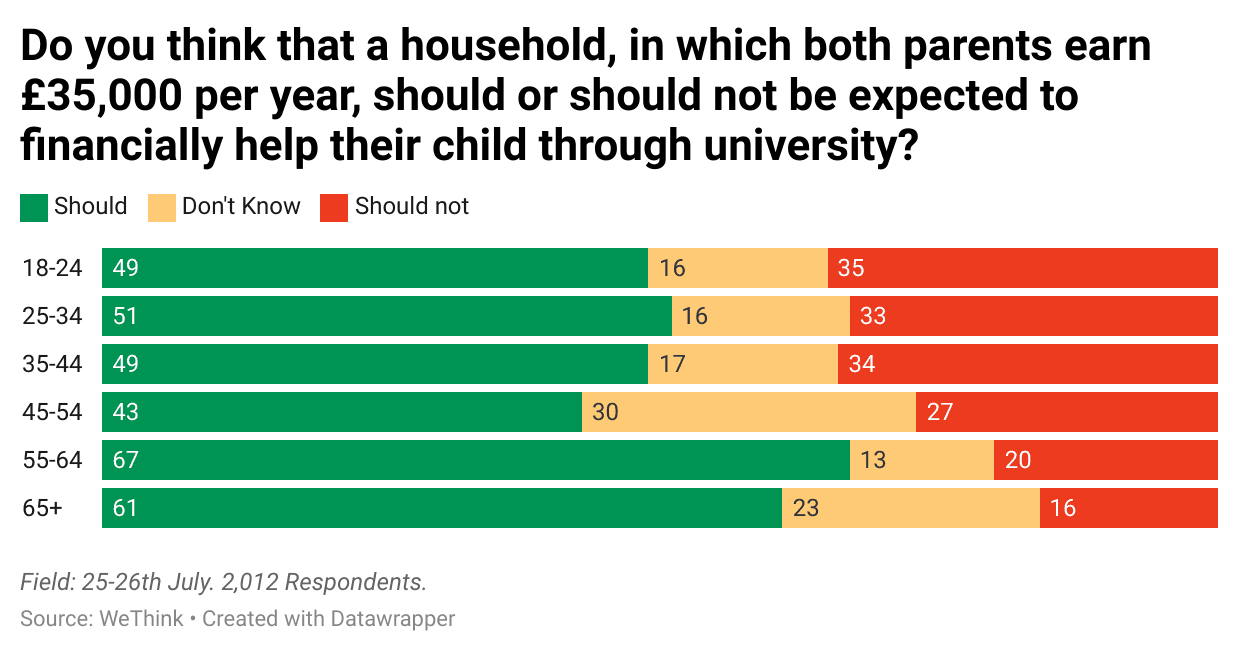
Split by age, we can see that, again, those over 55 are much more likely to think parents should contribute to university costs, whilst younger people are less united, but still on balance think that they should.
Skills England and Vocational Training
Starmer has started focusing on another area of significant public approval - Vocational qualifications / skills training. Last Monday, the government announced that they would be setting up ‘Skills England’, a body aimed at addressing the skills gap in the UK through greater communication between employers, institutions, and government.
In our polling, we found that 62% of Brits think that there should be more focus on Vocational Qualifications over University. There was a majority across all age groups, though people under 35 were less united than especially over 65 year olds, with three quarters agreeing.
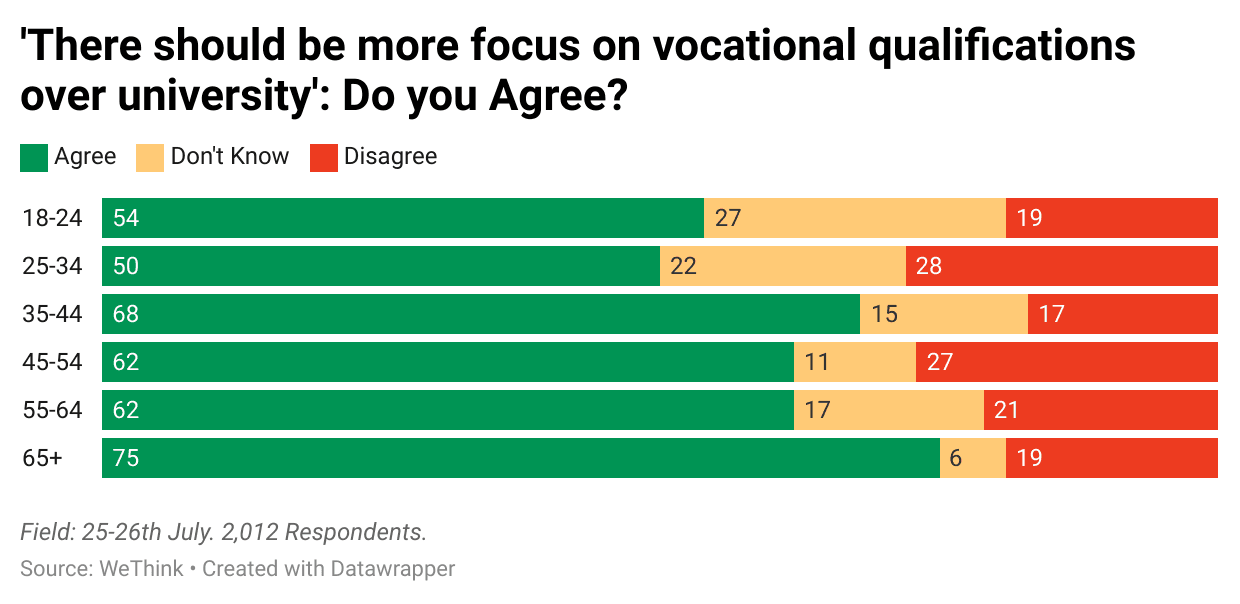
The strongest party support for focusing on vocational education included Reform (73%), Labour (66%), and the Liberal Democrats (60%). Across all parties, however, there is a majority for agree. The indication, therefore, is that Skills England, whilst not delivering change for the whole UK thanks to devolution, is a step in the right direction according to British voters.
There is also apparent scope for further changes to the balance between vocational qualifications and universities. Whilst 65+ year olds are the most likely to support increasing focus on vocational qualifications, support is second strongest in 35-44 year olds, who will increasingly become the target of political messaging as demographic shifts happen.
According to our data though, the mandate to reform vocational education does not reach into reducing the amount of people going to university.
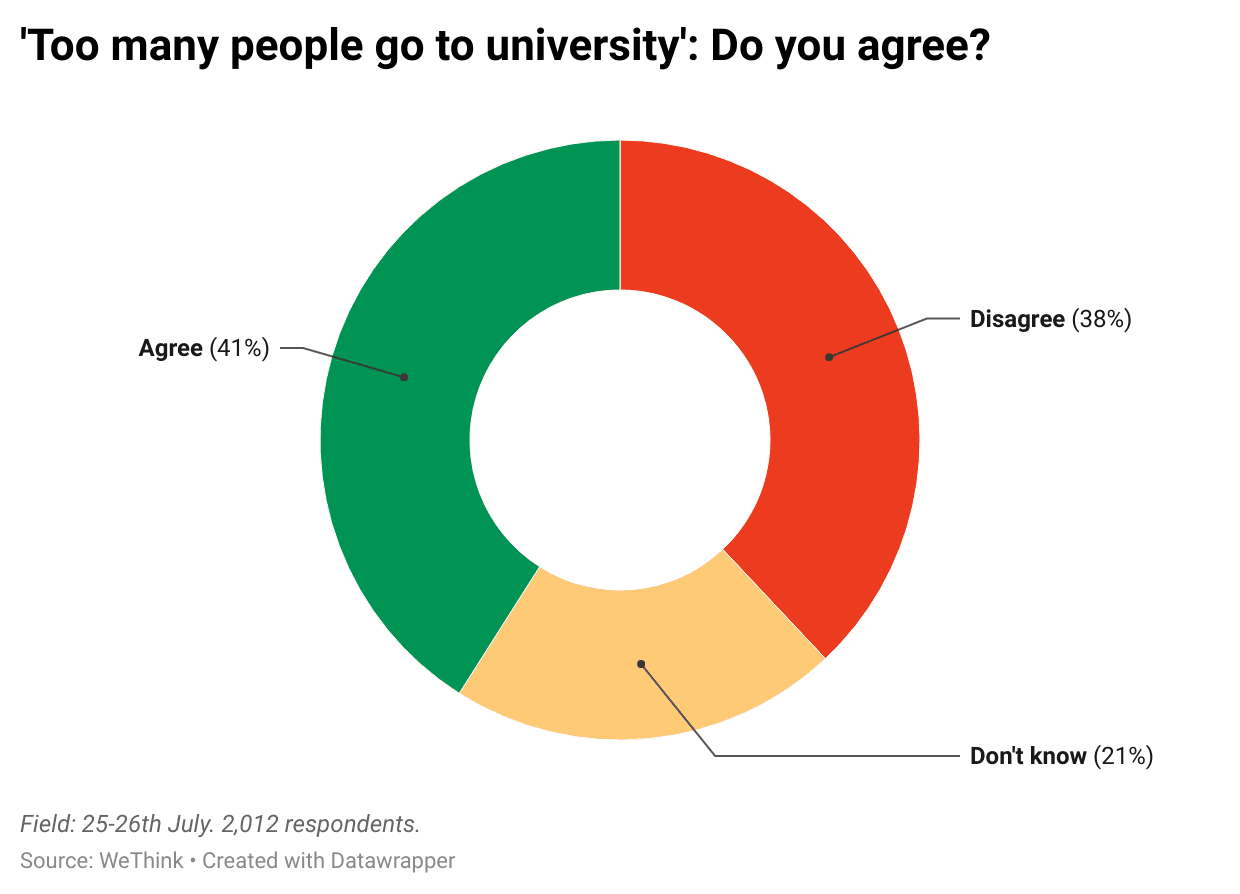
There is only 3% between those that agree and disagree that too many people go to university, and neither side enjoys a majority. This suggests that Brits would like to see more focus on vocational education, but not at the expense of those who would prefer to go to university.
According to our data on age groups, there will be even less of a mandate to reduce university places in the future, as those who are under 55 are much more likely to disagree that too many people go to university. These ages still have a majority thinking that there much be more focus on vocational qualifications though, reinforcing the analysis that this is about more funding for vocational skills, not less for universities.
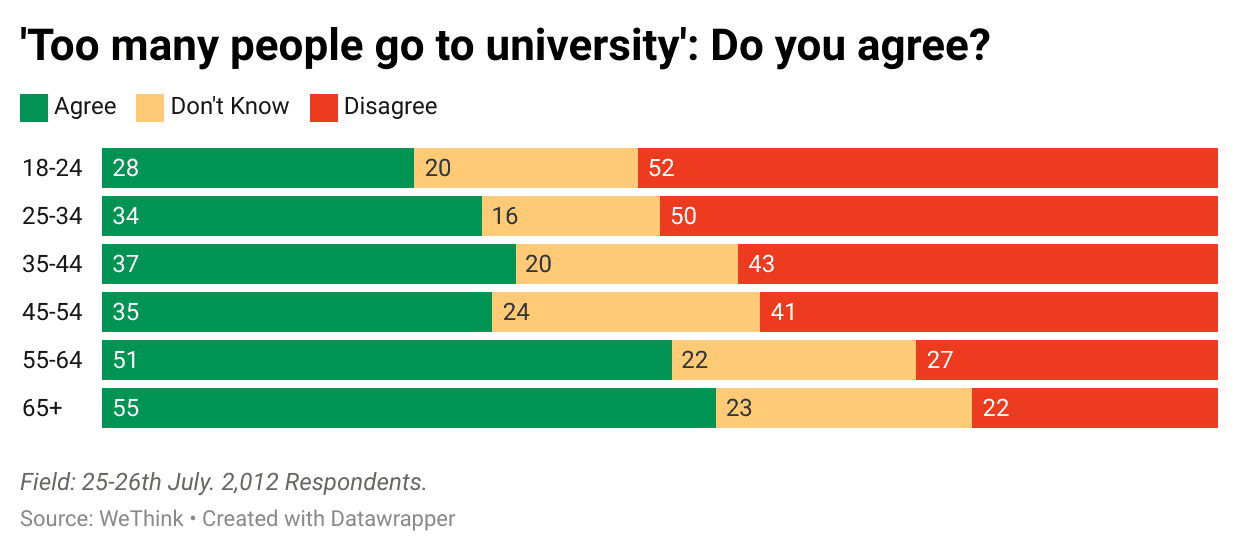
A popular policy, therefore, may be something more expansive and holistic than Skills England, perhaps modelled after the German vocational education system. They bring together the national and federal governments, and small to medium sized businesses. In many ways Skills England is a similar model - alternatively, the German system implements dual learning - half a week in the classroom, the other half working with the company.
Conclusions
We’ve learnt, through our data, that Brits want to see more investment in skills and training, and overwhelmingly want to reduce costs to go to university. This could include reform of the current student loan system, though there are a lot of undecided voters, and a plurality support the current system.
As discussed, the next steps for Starmer and his party could include a greater emphasis on Skills England, including more ties between businesses and training schools. It could also include a campaign to persuade people to back student finance reform, or even free university education, after his economic conditions are met.
Whatever Starmer does, 80% of the public thinking university is too expensive should give him confidence to reform the system.
‘24
By: Atyeo Thomas du Toit
Sign up for our newsletter
Stay up-to-date with the latest poll results and insights.

